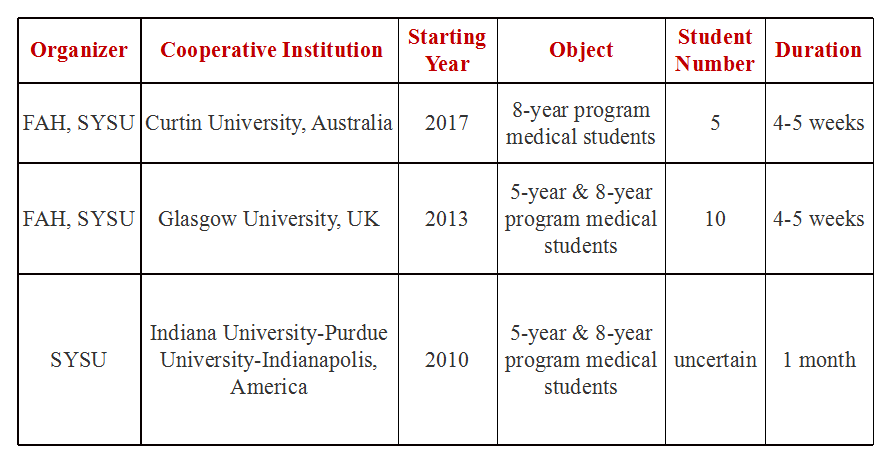-
Undergraduate Education and the Eight-year Postgraduate Education?
Our hospital is the largest clinical teaching base of Sun Yat-sen University, undertaking over 40% of medical education for undergraduates, which includes theoretical teaching and clinical practice teaching. Our faculty includes many distinguished members, including 1 national-class outstanding teacher, 3 provincial outstanding teachers, 5 Baogang?Excellent?Teachers and 8 Nanyue Excellent Teachers.?
We also offers?an eight-year education program that awards candidates with a doctoral degree. The selection?for the 8-year program is competitive and demanding. Requirements for the?doctoral degree include a?high level of medical theory, English proficiency, scientific research and as well as clinical practice. After 6 years of general medical courses and clinical training, students choose their specialty. Generally, we recruited around 35 students as doctoral candidate each year.
-
Graduate Education
At present, there are 31 disciplines and 100 specialties in our hospital, including 5 second-class national key disciplines, 1 National-Local Joint Engineering Laboratory of Vascular Disease Treatment, 2 key laboratories of ministry of health, 6 key laboratories of Guangdong province, and 28 national clinical key specialties. The hospital?is?the post-doctoral?station of?clinic?medicine?and?has 25/27 second-level disciplines authorized to confer doctoral degrees/ master’s degrees. Besides, our hospital offers 2 programs leading to professional degrees.
The hospital currently has about 192 doctoral advisors, among whom 2 are attracted by the Thousand Talents?Plan, 2 are Cheung Kong Scholars , 4 are Zhujiang Scholars, 3 are awardees of National Science Fund for Distinguished Young Scholars. Besides, there are 412 master’s advisors in our hospital. The advisors from all age groups contribute to our hospital’s high teaching standards and academic excellence.
Up to December 2016, there were 881 registered graduate students, including 330 doctoral candidates and 551 master’s degree candidates. There were 17 from Taiwan, Hongkong and Macau and 21 from other countries overseas among all the graduate students.
Committed to exploration and innovation, the first affiliated hospital of SYSU has been forging ahead in the area of graduate education, under the guidance of the Scientific Outlook on Development. Since 1978, over 1500 doctoral candidates and 2700 master’s degree candidates graduated from the first affiliated hospital of SYSU. The hospital has been upholding the principle of fairness, openness and impartiality during the whole admissions procedures. Students are classified into different types and are advised accordingly. Programs of different duration are created. In the whole cultivation period, the hospital focus on academic norms, encourage high levels of output with plenty of international cooperation and incentive policy. Through a variety of initiatives, the hospital actively promotes the reform of graduate training mechanism, and keeps building a quality assurance system for graduate students.
?
The International Exchange Programs for the Undergraduate Students in FAH of SYSU

-
The student exchange program between Curtin University and FAH, SYSU the Memorandum of Understanding between the 2 parties was signed in January of 2017, aiming to facilitate mutually beneficial academic and research cooperation, which includes the exchange of undergraduate students. The first group of 5 students had been sent to Curtin University for 1-month study in July of 2017 and the student exchange program remains to be expanded.
-
The student exchange program between Glasgow University and FAH, SYSU the student exchange agreement between 2 parties was signed in July of 2013.The program sees 10 students from each university spend four to five weeks during the summer in Glasgow and Guangzhou each year.
This exchange program is the first of its kind between the UK and China and gives students from both universities a wonderful opportunity to experience medicine in a different social and cultural context and healthcare systems that differ in the challenges that they face. It also helps them to broaden their horizons and develop links with colleagues in other countries. In addition to exchanging students, the program has enabled the exchange of ideas between faculties and provides a firm foundation for broader academic collaboration.
-
The student exchange program between IUPUI and Sun Yat-sen University?was dated back to 2010. According to the agreement signed by both universities, SYSU selects around 12 medical students and sends them to IUPUI for short-term exchange each year. Both of the 5-year and 8-year program medical students in our hospital can apply for the program.
?

